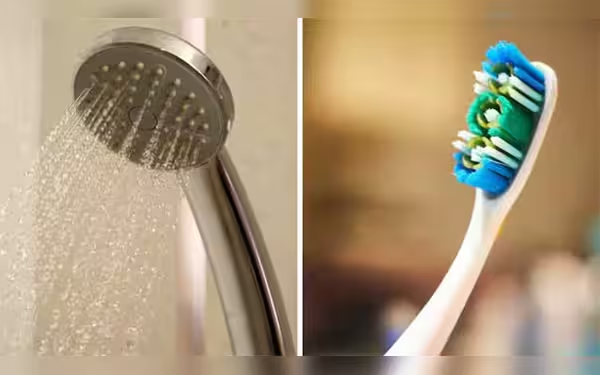Saturday, November 16, 2024 07:53 PM
Unseen Microbes Found on Toothbrushes and Showerheads
- New microbes discovered on common household items.
- Different virus types found on toothbrushes and showerheads.
- Regular cleaning can reduce infection risks.
 Image Credits: dunyanews.tv
Image Credits: dunyanews.tvResearch reveals unseen microbes on toothbrushes and showerheads, emphasizing the need for better hygiene practices.
In our daily lives, we often overlook the tiny organisms that inhabit our surroundings. Recent research has shed light on a rather surprising discovery: microbes that have never been seen before are thriving on common household items like toothbrushes and showerheads. This revelation raises important questions about hygiene and the unseen dangers that may lurk in our bathrooms.
The study was initiated by a researcher named Hartmann, who was particularly concerned about the potential for aerosol particles to be released into the air when flushing a toilet. This concern is not unfounded, as previous studies have indicated that flushing can indeed create a mist of tiny droplets that may carry bacteria and viruses. Hartmann's investigation aimed to explore the types of viruses present on toothbrushes and showerheads, two items that are frequently used in our daily routines.
During the research, Hartmann noted, "We saw basically no overlap in virus types between showerheads and toothbrushes." This finding suggests that while both items are breeding grounds for microbes, they host different types of viruses. This distinction is crucial because it indicates that the sources of contamination may vary, and therefore, the methods for maintaining hygiene should be tailored accordingly.
Understanding the presence of these microbes is essential for public health. It highlights the importance of regularly cleaning and replacing our toothbrushes and showerheads to minimize the risk of infection. Simple practices, such as rinsing toothbrushes thoroughly after use and ensuring that showerheads are cleaned regularly, can go a long way in protecting our health.
While it may be unsettling to think about the unseen microbes that inhabit our homes, awareness is the first step towards better hygiene. By taking proactive measures to clean our personal items, we can significantly reduce the risk of exposure to harmful bacteria and viruses. Remember, a little knowledge can empower us to make healthier choices in our everyday lives.













